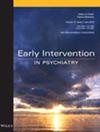Uncertainty Mentalizing and Emotion Dysregulation With Substance Use Severity in Iranian Young Adults; Mediating Role of Borderline Personality Traits
Abstract
Objective
The rising prevalence of substance use amongst young people (ages 18–25) is a critical global health issue, especially in non-Western contexts where cultural factors impact mental health. This study explores the role of uncertainty mentalizing—understanding ambiguous social situations—in individuals with borderline personality traits and its link to substance use, a relationship that remains underexplored amongst young Iranian people. It further examines the mediating role of borderline personality traits in the relationship between uncertainty mentalizing, emotion dysregulation and substance use severity.
Method
The study included 185 people who use substances aged 18–25 years who completed questionnaires related to the research variables.
Results
Analysis Revealed Significant Positive Associations Amongst all Variables (p < 0.001). Borderline Personality Traits (β = 0.19, p < 0.05) and Uncertainty Mentalizing (β = 0.45, p < 0.001) Directly Influenced Substance Use Severity. Uncertainty Mentalizing Also Indirectly Affected Substance Use Severity Through Borderline Personality Traits (Indirect Effect = 0.093, p < 0.05) and Notably Impacted Borderline Personality Traits (β = 0.49, p < 0.001). However, Emotion Dysregulation Did Not Show Significant Direct or Indirect Effects.
Discussion
These results highlight the critical role of uncertainty mentalizing in substance use severity, both directly and through its influence on borderline personality traits, suggesting that interventions aimed at enhancing uncertainty mentalizing may effectively address co-occurring issues related to substance use and borderline personality traits.

 求助内容:
求助内容: 应助结果提醒方式:
应助结果提醒方式:


